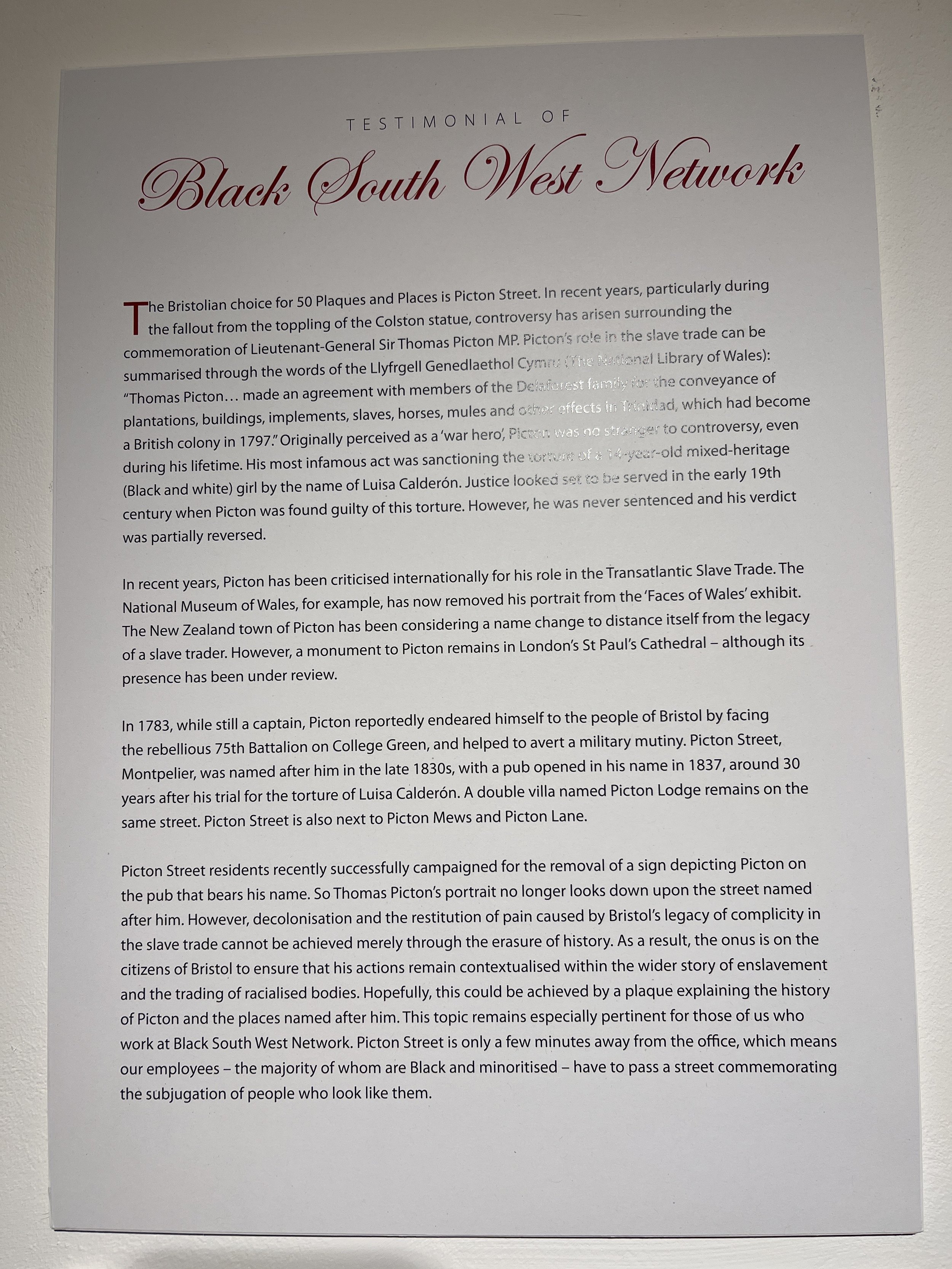A Reflection on the TTEACH 50 Plaques & Places Launch Exhibition
Written by Japheth Monzon, Project Officer
On Thursday the 5th of October, 2023, I was lucky enough to represent BSWN at the TTEACH Plaques Launch held at The Tabernacle in Central London. TTEACH Plaques – an acronym for Transatlantic Trafficked Enslaved African Corrective Historical Plaques – is a descendent-led initiative founded by Gloria Daniel with the support of the SOAS School of Law, Gender and Media. This incredible initiative aims at placing a much-needed spotlight on places and people ‘incontrovertibly tied to the transatlantic slave economy.’
“50 Plaques & Places draws together multiple voices – artists, poets and descendants of both the enslaved and enslavers. Everyday people who recognise reparative justice lies not in the hands of the ‘Gatekeepers of Britain’.
The price of justice cannot and must not be exclusively determined by the heirs of the perpetrators. 50 Plaques & Places strives to claim that space, inviting its audience to demand multiple sites of conscience.”
Image of Project Officer, Jeff Monzon (centre) pictured with Gloria Daniel (left).
The Exhibition, a resounding success, displayed all 50 plaques contributed by individuals and organisations throughout England & Wales. The mood was solemn, yet celebratory, acknowledging the atrocities that were committed in the name of colonialism. The work done by TTEACH Plaques is an important aspect of historical education; it is a collective effort to combat the collective amnesia of Britain’s role in the transatlantic slave trade, a term often attributed to historian Russell Jacoby. Indeed, the legacies of enslavement pervade even the most subtle aspects of our society – in art, in architecture, in memory, and in how we treat others around us. This initiative, we hope, will make the general public aware of the salience of historical enslavement and its modern iterations of anti-Blackness and racism.
Image of BSWN’s Contribution displayed on a Plaque.
As part of our racial justice work, Black South West Network was kindly asked to contribute to the growing list of places tied to the transatlantic slave economy. The BSWN office (The Coach House), situated in the neighbourhood of St Paul’s in Bristol, lays a stone-throw away from Picton Street and Picton Lane, streets named after General Thomas Picton MP. As a result, BSWN elected to spotlight the sordid legacy of General Picton. Found below is our statement of justification for our choice of Picton Street.
Statement of Justification for the Choice of Picton Street
The Bristolian choice for 50 Plaques and Places is Picton Street. In recent years, particularly during the fallout of the toppling of the Colston Statue, controversy arose surrounding the commemoration of Lieutenant-General Thomas Picton MP. Picton’s role in the slave trade can be summarised through the words of the Llyfrgell Genedlaethol Cymru (The National Library of Wales): “Thomas Picton… made an agreement with members of the Delaforest family for the conveyance of plantations, buildings, implements, slaves, horses, mules and other effects in Trinidad, which had become a British colony in 1797.” Originally perceived as a ‘war hero’, Picton was not without controversy even during his own time. His most infamous act was the torturing of a 14-year-old mixed-heritage (Black and white) girl by the name of Luisa Calderón. Justice was almost sought when Picton was found guilty in the early 19th century for his torture. However, he was never sentenced and had his verdict partially reversed.
Thomas Picton, in recent years, has been criticised internationally for his role in the Transatlantic Slave Trade. Wales, for example, has selected to remove a portrait of Picton from the ‘Faces of Wales’ exhibit in the National Museum of Wales. Moreover, London’s St Paul’s Cathedral has been reckoned with the legacy of Picton, represented through a statue of his likeness in the Cathedral. Within New Zealand, the town of Picton has been considering a change in its name to deny further commemoration of the legacy of a slave trader such as Thomas Picton.
Within Bristol, the street of Picton Street, Montpelier, was named after him in the late 1830s, with a pub opened in his name in 1837 – just around 30 years since his trial for the torture of young Luisa Calderón. It is reported that in 1783, while still a captain, Picton endeared himself to Bristolians by facing the rebellious 75th Battalion on College Green, Bristol and averting a military mutiny. One must also note that a double villa named ‘Picton Lodge’ remains in the same street. Picton Street is also situated next to Picton Mews and Picton Lane.
The residents of Picton Street have recently requested the removal of his portrait situated on the edifice of a pub named after him. Currently, Thomas Picton’s portrait no longer looks upon the street named after him. However, it must be noted that decolonisation and the restitution of pain caused by Bristol’s legacy of complicity in the slave trade cannot be achieved merely through the erasure of history. As a result, the onus is on the citizens of Bristol to ensure that his actions remain contextualised within the wider historical context of enslavement and the trading of racialised bodies. Hopefully, this could be achieved by a plaque explaining the history of Picton and the places named after him. This topic remains especially relevant to those who work at Black South West Network, for Picton Street is a mere eight minutes from the office – leading to our employees (a majority of whom are Black and Minoritised themselves) having to pass a street commemorating the subjugation of people who look like them.
Image of BSWN’s Statement of Justification displayed at the Exhibition.
The TTEACH Plaques Exhibition will run from the 5th of October 2023 to the 28th of October 2023 at The Tabernacle, 34-35 Powis Square, London, W11 2AY.
Sources
https://www.bristolpost.co.uk/news/bristol-news/old-pub-sign-showing-british-4251391
https://www.library.wales/discover-learn/education/learning-resources/thomas-picton-hero-or-villain
https://www.bristolpost.co.uk/news/bristol-news/general-thomas-picton-sign-now-4710061
https://en.wikipedia.org/wiki/Thomas_Picton#Burial_and_monuments




